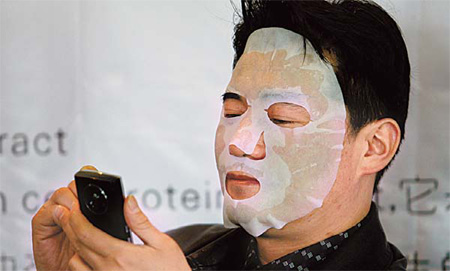Males turn to cosmetic appearance
"City jade men" groomed for success as they boost demand for makeup.
It started with just a few cosmetics stolen from his wife, but before long Ben Shiyuan was using facial toners, cleansing milk and moisturizers every morning.
 |
|
A young man undergoes facial skincare treatment at a beauty fair in Wuhan, Hubei province, in this file photo taken in April last year. |
"And that's just the tip of the iceberg," said the 39-year-old Beijing executive.
"I use mud masks and have weekly facial scrubs, and use concealer to hide the dark circles around my eyes and foundation if my skin looks wan."
Ben is among the many du shi yu nan - "city jade men", the Chinese term for metrosexuals - who have transformed China into a key market for men's cosmetics.
Sales of men's health and beauty products in China were set to overtake North America in 2010 and will probably
grow about five times faster until 2014, according to consultants Euromonitor International.
The dynamic growth is being fueled by the fact "Chinese men have become more comfortable with buying their own grooming products", said Euromonitor analyst Kevin Zhu.
"They no longer have to borrow cosmetics from their wives or girlfriends."
Sociologists say that confidence has also coincided with a greater desire to impress in the workplace.
Data released by consultancy firm CTR suggests almost 40 percent of urban men used skincare products or cosmetics in the first half of 2010, including more than 60 percent of businessmen.
"Taking care of your appearance is absolutely not feminine behavior, especially for old people like me in industries dominated by young and energetic people," said Ben Shiyuan, a senior manager at a social networking company, who admitted to using Lancome mascara before important meetings and presentations.
"Looking good helps win me appreciation, especially when I'm working with young staff members," he added. "It also shows my business partners that I'm serious and detail-orientated, with a spirit for innovation."
Cosmetics also come in handy for job seekers looking to make an impression on prospective employers.
Although appearance only accounts for 20 to 30 percent at an interview, "when candidates are extremely similar in terms of capabilities, good looks can become a key factor", said Judy Zhu, a manager at Career International Consulting who specializes in the high-tech sector.
Expert cosmetic advice is now offered to city jade men in many lifestyles magazines, including offshoots of popular global fashion publications such as Bazaar Men's Style published by Trends and Conde Nast's GQ China.
"We run one feature story about men's cosmetics every issue," Zou Wen, an editor at GQ China, told Bloomberg news agency last month. "Reader feedback from the Internet tells us they want two to three such articles."
 0
0 






